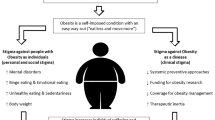Abstract
Background and Objectives
Although more and more genetic information is available, it is unclear whether this information is helpful for patients. Therefore, we assessed the positive and negative effects of informing obese people about the genetic etiology of being overweight.
Design, Participants
Two hundred ninety-four obese people were randomized to 2 interventions (a 1-session consultation for obese people on how to manage obesity either including genetic information or not); their results were compared to a control group (116). Subjects were assessed before and after consultation and 6 months later.
Measurements
Weight, scales on feeling guilty for being overweight, self-control, negative mood (primary endpoint), body acceptance, restraint eating.
Results
Both types of consultations were considered helpful by the participants, and had comparable effects on body weight. The consultation with genetic information was rated superior in terms of leading to new insights (advantage for consultation with genetic information, even 6 months later; p = 0.046). No negative effects (e.g., loss of self-efficacy/self-control, increase of body weight; all p > 0.20 for interaction consultation × time) were observed for informing obese people about the genetic etiology of being overweight. The consultation resulted in long-term improvement of negative mood if it included genetic information in the case of participants with a family history of obesity and if it included no genetic information in the case of obese people without a family history of obesity (p = 0.03 for interaction of group, intervention, and time).
Conclusions
Consultations in obesity can be helpful in general. These consultations should include genetic information if people have a family history of obesity.

Similar content being viewed by others
References
Stunkard AJ, Harris JR, Pedersen NL, McClearn GE. The body mass index of twins who have been reared apart. N Engl J Med. 1990;222:1483–7.
Farooqi IS, Keogh JM, Yeo GSH, Lank EJ, Cheetham T, O’Rahilly S. Clinical spectrum of obesity and mutations in the melanocortin 4 receptor gene. N Engl J Med. 2003;348:1085–95.
Hinney A, Bettecken T, Brumm H, et al. Prevalence, spectrum and functional characterization of Melanocortin-4 receptor gene variations in a representative population-based sample and obese adults from Germany. J Clin Endocrinol Metab. 2006;91(5):1761–9.
Dempfle A, Hinney A, Heinzel-Gutenbrunner M, et al. Large quantitative effect of melanocortin-4 receptor gene mutations on body mass index. J Med Genet. 2004;41(10):795–800.
Byrne SM. Psychological aspects of weight maintenance and relapse in obesity. J Psychosom Res. 2002;53:1029–36.
Goodrick GK. Inability to control eating: Addiction to food or normal response to abnormal environment? Drugs Soc. 1999;15:123–40.
Marteau T, Senior V, Humphries SE, et al. Psychological impact of genetic testing for familial hypercholesterolemia within a previously aware population: A randomized controlled trial. Am J Med Genet. 2004;128A:285–93.
Stunkard A, Sörensen T, Schulsinger F. Use of the Danish Adoption Register for the study of obesity and thinness. In: Kety S, Roland L, Sidman R, Matthysse S, eds. The Genetics of Neurological and Psychiatric Disorders. New York: Raven Press; 1983.
Bulik CM, Wade TD, Heath AC, Martin NG, Stunkard AJ, Eaves LJ. Relating body mass index to figural stimuli: Population-based normative data for Caucasians. Int J Obes. 2001;25:1517–24.
Van Strien T, Frijters JER, Bergers GPA, Defares PB. The Dutch Eanting Behavior Questionnaire (DEBQ) for assessment of restrained, emotional and external eating behavior. Int J Eat Disord. 1986;5:295–315.
Deusinger IM. Die Frankfurter Körperkonzeptskalen (FKKS) [The Frankfurt self-concept body scales]. Göttingen: Hogrefe; 1998.
Conradt M, Dierk JM, Schlumberger P, Rauh E, Hebebrand J, Rief W. Development of the weight- and body-related shame and guilt scale (WEG-SG) in a nonclinical sample of obese subjects. J Pers Assess. 2007;88:317–27.
Schwarzer R, Jerusalem M. Generalized self-efficacy scale. In: Weinman J, Wright S, Johnston M, eds. Measures in Health Psychology: A User’s Portfolio. Windsor, UK: NFER-NELSON; 1995:35–7.
Watson D, Clark LA, Tellegen A. Development and validation of brief measures of positive and negative affect: The PANAS scales. J Pers Soc Psychol. 1988;54:1063–70.
Frosch DL, Mello P, Lerman C. Behavioral consequences of testing for obesity risk. Cancer Epidemiol Biomark Prev. 2005;14:1485–9.
Lerman C, Croyle RT, Tercyak KP, Hamann H. Genetic testing: Psychological aspects and implications. J Consult Clin Psychol. 2002;70:784–97.
Teixeira PJ, Going SB, Sardinha LB, Lohman TG. A review of psychological pre-treatment predictors of weight control. Obes Rev. 2005;6:43–65.
Carels RA, Darby L, Cacciapaglia HM, et al. Applying a stepped-care approach to the treatment of obesity. J Psychosom Res. 2005;59:375–83.
Wadden TA, Brownell KD, Foster GD. Obesity: Responding to the global epidemic. J Consult Clin Psychol. 2002;70:510–25.
Dansinger M, Gleason JA, Griffith JL, Selker HP, Schaefer EJ. Comparison of the Atkins, Ornish, weight watchers, and zone diets for weight loss and heart disease risk reduction. JAMA. 2005;293:43–53.
Acknowledgement
This study was supported as part of the national genome research network NGFN by a grant from the German Ministry of Education and Research BMBF to Dr. Rief et al.
Conflict of Interest
None disclosed.
Author information
Authors and Affiliations
Corresponding author
Rights and permissions
About this article
Cite this article
Rief, W., Conradt, M., Dierk, JM. et al. Is Information on Genetic Determinants of Obesity Helpful or Harmful for Obese People?—A Randomized Clinical Trial. J GEN INTERN MED 22, 1553–1559 (2007). https://doi.org/10.1007/s11606-007-0353-7
Received:
Revised:
Accepted:
Published:
Issue Date:
DOI: https://doi.org/10.1007/s11606-007-0353-7




